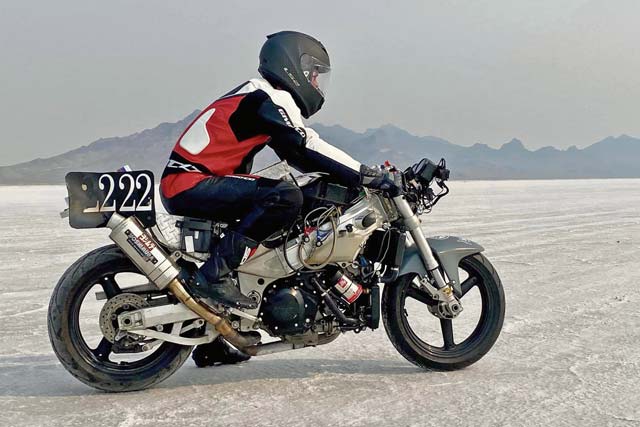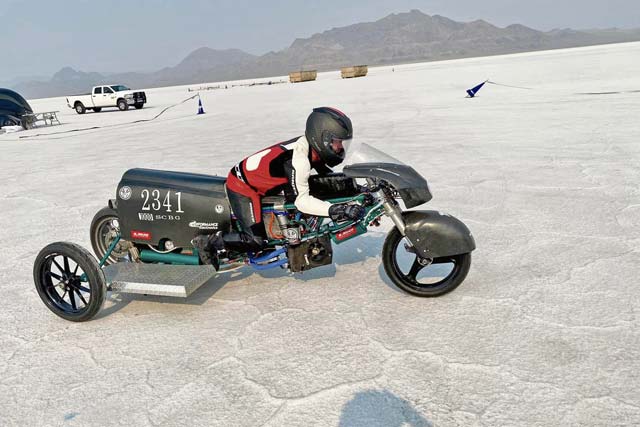
Sitting astride a custom-built motorcycle, gearing up to race at speeds nearing 200 mph down a dry lakebed, Jaron Tyner isn’t thinking about his nerves.
“When you’re in line on the salt flats, you aren’t really nervous because you’re preparing to go,” he said. “You’re concentrating on the bike, the course and maintaining control. You’re pushing it to the limit and hoping, more than anything, it doesn’t blow up on you.”
Tyner, a 21-year Air Force veteran and 13-year Defense Logistics Agency Energy quality assurance representative, is a member of a motorcycle race team that is multiple-time national champion and world record holder for land speed racing at the Bonneville Salt Flats in Utah. Nicknamed the “Speed Capital of the World,” Bonneville is ideal for racing because of the barren, flat and vast terrain.
“I grew up riding, and Bonneville is on a bucket list for gear heads and people that like motorcycles,” Tyner said.
In 2017, Tyner and his wife finally visited the salt flats. That day, Tyner volunteered at a race and said from then on, he was hooked.

This year, the Bonneville Motorcycle Speed Trials is scheduled to run Aug. 27 to Sept. 1. The team plans to race their 2002 Suzuki TL1000, “Mad Max,” which currently holds the record for that motorcycle class at 171 mph with streamlining and 157 mph “naked” without any streamlining. This year, the team plans to race the bike naked again.
“We plan on racing again to break our own record, if luck is on our side,” Tyner said. “We want to go faster than 171 mph.”
The team hopes to race another bike they call, the Coconut Express — a heavily modified Ducati Superbike. While they aren’t planning to break any records, their goal is to gather data for next year’s attempt, Tyner said.
“There’s no place to test the 10-foot long, 3-foot tall, twin turbo racer with only a tiny rear brake,” he said. “It needs a minimum of 5 miles just to test.”
Tyner’s teammates credit him with being the genius behind their racing success because of his engineering ingenuity.
“We are a grassroots effort,” Tyner said. “Our machines are designed and built solely in our garages by our own hands.”
His goal is to come up with innovative ideas to make them go faster.
“Most of our bikes are 100 percent purpose-built and not just souped-up street bikes,” Tyner added. “You can’t just order up a kit to make a record-breaking bike. I design and make nearly everything by hand, including the chassis, injection systems and computer triggers.”
When he’s not racing, Tyner serves as an official, a motorcycle inspector and a technical steward for the Federation Internationale de Motocyclisme, the international organization for motorcycling activities.
“These highly specialized bikes require careful inspection by three licensed technical stewards to be deemed safe to race,” he said.
As one of only five licensed stewards at Bonneville for this year’s race, Tyner will spend a lot of time inspecting race bikes and working in the tower as a controller.
“Experience and attention to detail go hand in hand with being successful in racing and being a DLA Energy QAR,” Tyner said. “Not adhering to the standards in the fueling world can have severe consequences for equipment and personnel.”
While technical focus may overshadow Tyner’s nerves at the Bonneville starting line this year, the end goal is to get the bike to the finish line.
“Hopefully we get another record and not a smoldering, melted motor or one of us crashing,” he said. “That sucks at these speeds!”


